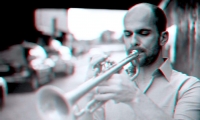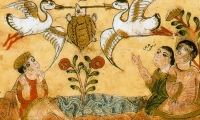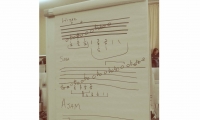Amir ElSaffar :
Interstices, for ensemble
Amir ElSaffar trumpet, santur, voice
Dirk Descheemaeker clarinets
Sylvain Devaux oboe, English horn
Tom De Cock percussion, cimbalom
Jean-Luc Plouvier microtonal piano
Igor Semenoff violin
Jeroen Robbrecht viola
Geert De Bièvre cello
Géry Cambier double bass
Alexandre Fostier sound
Amir ElSaffar : INTERSTICES
Resonance
SegahWorld
Chord
HD Blues
Bayat Pent
19
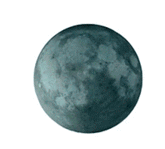
Production Fondation Royaumont.
Coproduction Ictus, Alwan Foundation-Alwan for the Arts.
With the support of Sacem and Fondation Camargo/The Jerome Foundation.
With patronage of KPMG and Groupe ADP.
The Amir ElSaffar's work has been commissioned by Fondation Royaumont.
LINK: The Amir ElSaffar website
TAGS Concertgebouw Brugge
Preliminary words by Amir ElSaffar ...

The new work will be composed for oboe/English horn, clarinet/bass clarinet, violin, viola, cello, double bass, percussion/cimbalom, re-tuned piano, plus myself on trumpet and santoor.
The piece will utilize maqâm in polyphonic contexts, including harmonic structures, heterophony, and overlaying of melodies akin to counterpoint.
The harmonic and melodic elements will be microtonal, reaching beyond the limits of typical maqâm modulation practices toward new harmonies and microtonal resonances, often creating difference tones and pulsations.
Ornamentation - trills, portamenti, wavering of pitch - as well as a wide variety of timbres based on maqâm practices will be precisely notated, and intrinsic to the melodic architecture.
Rhythmically, the piece will alternate between free sections that have pulse but no discernible meter, sections that are rhythmically rigorous and layer repeating cycles of varying (but related) number, speed, and impulse.
Emphasis will be given to silences.
(ElSaffar, 2017)

A moving singer, jazz trumpeter and santur player (a kind of cymbalum of Iranian origin), Amir ElSaffar tries to find his way between writing and oral transmission. And we try to follow him! At the centre of his work are the learning of microtonal scales, the melodic use that the musician makes of them, and the affects that they express - the Arabic language uses the word maqâm to refer to these three questions, which are one and the same.
Confronted with the music of the maqâms (whose tradition crosses the Arab, Persian and Turkish worlds), the Western-trained musician is suddenly seized with a particular embarrassment; the slightest fatigue, the slightest doubt about himself, and there he is, feeling like a brute thrown into a porcelain world.
—It's all over, he said to himself in secret, it's all over with hitting the notes for what they are! And your dear extended techniques won't do a thing about it, smartass!
Total reset: from now on you must slow down the reading, free up time for quiet study, unfold the modes one after the other, let an infinitely modulated voice rise up, sculpting each intonation as if in the morning of the world. For the mode is mood: that of noon is not that of evening, the praise of being alive is not the complaint of love, etc.
An American of Iraqi origin, Amir ElSaffar spent his twenties studying maqâm. Then he went through a lot of Western music: classical music and jazz - especially jazz (listen to his band Rivers of Sound). On the trumpet as well as on vocals, the subtility of his phrasing would make a rock cry.
ElSaffar gave us the pleasure of a seminar at Royaumont (1), of a few maqâm lessons, of a bunch of pieces written on paper, which give pride of place to the work of polyrhythms. No doubt there is no automatic interface between the worlds, no massive transcoding surface; yet common breaths emerge... the gentle exaltation of endless work,... the promise of a possible universality: interstices.
JLP
(1) Thanks to Royaumont, thanks to Fabrizio Cassol.
Voor klassiek geschoolde muzikanten is het niet altijd evident om geconfronteerd te worden met de finesses en de micro-intervallen van muziek die gebaseerd is op maqâm-tradities (een traditie die zowel voorkomt in de arabische, Perzische als Turkse cultuur); je voelt je al gauw als een olifant in een porseleinkast, verloren in een onbekende klankwereld….
Daarom is het belangrijk om als muzikant alle ‘modes’ traag te ontdekken, ze een voor een te kauwen als het ware tot ze evident worden voor onze westerse ‘ontstemde’ oren. Een mode in de maqâm geeft eerder de stemming van het moment weer: de maqâm die gebruikt wordt bij het ontluiken van de dag is niet dezelfde als degene die deze dag afsluit…
De Amerikaans-Irakese trompettist Amir ElSaffar spendeerde het leeuwendeel van zijn twintiger jaren aan de studie van maqâms. Aansluitend verkende hij alle facetten van de westerse muziekwereld, met een focus op jazz. Zijn rake frasering op zowel trompet als wanneer hij zijn stem laat horen liet niemand onbewogen….
We hebben het genoegen om met ElSaffar deze traditie te verkennen in een seminarie in de abdij van Royaumont. Interstices beloofd een gezamenlijk in- en uitademen, een kruispunt tussen onze verschillende muzikale werelden.
Chanteur bouleversant, trompettiste de jazz et joueur de santur (sorte de cymbalum d'origine iranienne), Amir ElSaffar tente de tracer son chemin entre l'écriture et la transmission orale. Et nous tentons de le suivre ! Au centre de son travail se trouvent l'apprentissage des échelles micro-tonales, l'usage mélodique qu'en tire le musicien, les affects qu'elles expriment — la langue arabe désignant du mot de maqâm ces trois questions qui n'en font qu'une.
Confronté à la musique des maqâms (dont la tradition traverse les mondes arabe, perse et turc), le musicien de formation occidentale est soudain saisi d'un embarras particulier ; la moindre fatigue, le plus léger doute sur lui-même, et voilà qu'il se sent comme une brute jetée au sein d'un monde en porcelaine.
C'est bien fini — se dit-il alors en secret — c'est bien fini de frapper les notes pour ce qu'elles sont ! Et tes chères extended techniques n'y pourront rien, gros malin !
Total reset : il faut désormais ralentir la lecture, libérer du temps pour l'étude calme, déplier les modes l'un après l'autre, laisser monter une voix infiniment modulée qui sculpte chaque intonation comme au matin du monde. Car le mode est un monde, et un mood : celui du midi n'est pas celui du soir, la louange d'être en vie n'est pas la plainte amoureuse, etc.
Américain d'origine iraquienne, Amir ElSaffar a brûlé ses vingt ans dans l'étude des maqâms. Puis il a traversé beaucoup de musique occidentale : la musique classique et le jazz — surtout le jazz (à écouter : son band Rivers of Sound) . A la trompette comme au chant, la justesse de son phrasé ferait pleurer un caillou.
ElSaffar nous a fait le plaisir d'un séminaire à Royaumont (1), de quelques leçons de maqâms, d'un bouquet de morceaux jetés sur le papier, qui font la part belle au travail des polyrythmes. Sans doute n'y a-t-il pas d'interface automatique entre les mondes, pas de surface massive de transcodage ; émergent pourtant des respirations communes, l'exaltation douce des travaux interminables, la promesse d'un universel possible : des interstices.
JLP
(1)Merci à Royaumont, merci à Fabrizio Cassol.
Agenda for this project
- Date Show Location
-
Sat 02.09 Interstices (with Amir ElSaffar) Abbaye de Royaumont - Royaumont (Paris) - France

- Date Show Location
-
Sun 18.11 Interstices (with Amir ElSaffar) Concertgebouw - Brugge - Belgium

- Date Show Location
-
Thu 14.02 Interstices (with Amir ElSaffar) BOZAR - Brussels - Belgium

-
Fri 15.02 Interstices (Amir elSaffar) Handelsbeurs - Ghent - Belgium

Watch & listen to this project
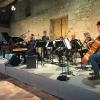
With Amir ElSaffar
Interstices, for ensemble, Royaumont 2017
2 soundcloud tracks